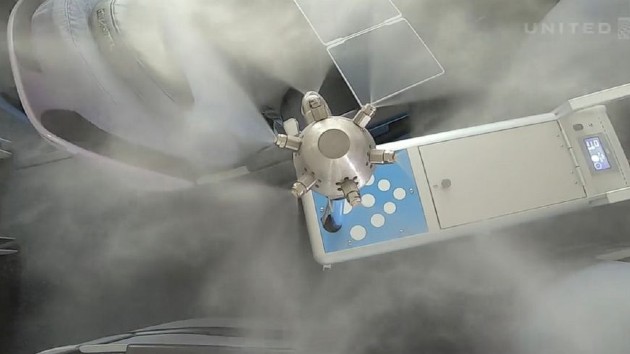
 United AirlinesBy MINA KAJI, ABC News
United AirlinesBy MINA KAJI, ABC News
(NEW YORK) — United Airlines is turning to a 100-pound robot in its latest effort to reassure customers that flying during the COVID-19 pandemic is safe.
United intends to use the robot, MicroSonic Solution’s NovaRover, during some of its aircraft’s “deepest cleanings” overnight at 10 U.S. airports.
For months, airlines have turned to electrostatic sprayers, but MicroSonic President Nicholas Federico said its machine is easier to operate, faster and removes any human error.
Federico demonstrated to ABC News how the NovaRover works — explaining how it it only takes about 90 seconds to disinfect the most popular aircraft. He has been working on the machine for four years and originally designed it for cruise ships.
The key feature, he said, is the omnidirectional nozzle that allows it to spray a super fine mist in six directions. A single spray can coat all surfaces within a 12-foot radius, according to the company.
That spray is called the Zoono Microbe Shield. It is an antimicrobial solution intended to create a protective layer on surfaces in order to create “a long-lasting repellent against microbes.” The solution is registered with the U.S. Environmental Protection Agency, but the company is still working on obtaining EPA approval.
It is currently only registered as safe and effective to use against mold, mildew and algae, according to an EPA spokesperson.
“The EPA has not authorized any residual or long lasting efficacy claims for this product,” the agency added.
The airline says the NovaRover isn’t intended to replace any of its existing, daily electrostatic spraying regimen, and that it will still use electrostatic sprayers every seven days to “refresh and fortify the protective layer” provided by NovaRover.
“This is one of the reasons that we have complementary technology that we’re using,” United Chief communications officer Josh Earnest told ABC News’ transportation correspondent Gio Benitez. “The combination of this antimicrobial technology, along with the disinfecting application technology that we’re using along with masks, all of that together provides for a really safe environment on board aircraft.”
Some experts are cautious of these types of disinfectants since they use quaternary ammonia, which has been found to contribute to asthma with high levels of exposure.
“Some of the disinfectants and even this antibiotic protective coating can be irritating to the respiratory tract, and people with conditions like asthma or other lung diseases may be more sensitive to the substance,” said Dr. Jay Bhatt, an ABC News medical contributor. “So there should be some caution used here and we should be studying more how these substances are impacting people and studying it against novel coronavirus in different situations.”
The company insists — even without EPA approval — that the coating is safe. They say that the chemical is classified by the EPA as a Category IV, “which is the lowest level of toxicity [and is not harmful to humans or pets],” and that spraying overnight prevents any potential adverse reactions.
“We do this overnight just to ensure customer safety,” Federico said. “The chemical used, once it’s bound, it’s completely bound to the surface itself — it can’t leave the surface.”
Three weeks ago, American Airlines announced it is preparing to spray planes flying in and out of Texas with the first “long-lasting” disinfectant product approved by the EPA to be effective against the SARS-CoV2 virus on surfaces between routine cleanings.
The EPA granted emergency authorization for the Allied BioScience product, Surfacewise 2, on Aug. 24. It is effective against the SARS-CoV2 virus for up to seven days after a single application, according to testing by the agency. Texas had requested the authorization.
EPA Administrator Andrew Wheeler called the approval of Surfacewise 2 a “game-changing announcement,” at the time but also made clear that the product is not intended to replace other measures, such as frequent cleaning with disinfectants, hand-washing, wearing masks and social distancing.
Copyright © 2020, ABC Audio. All rights reserved.
